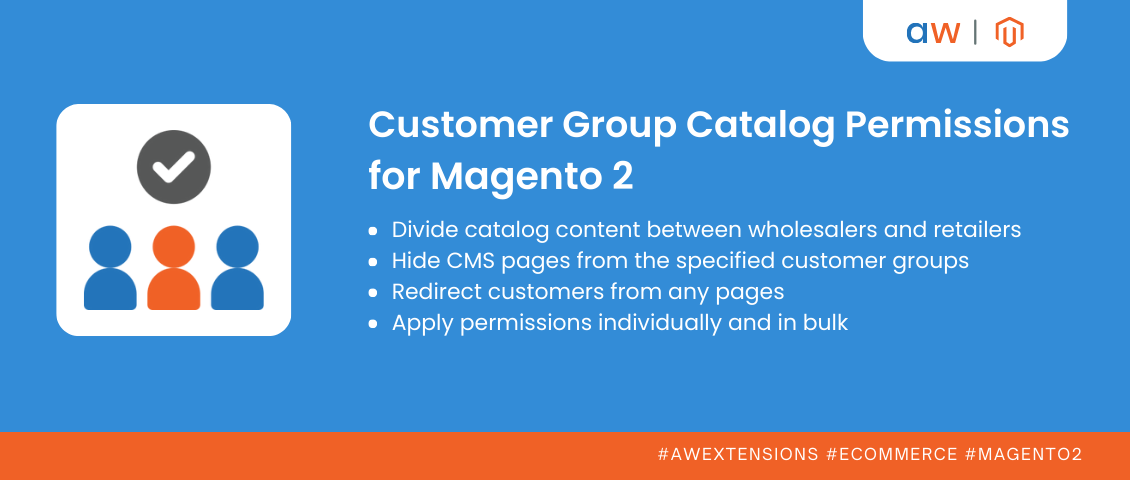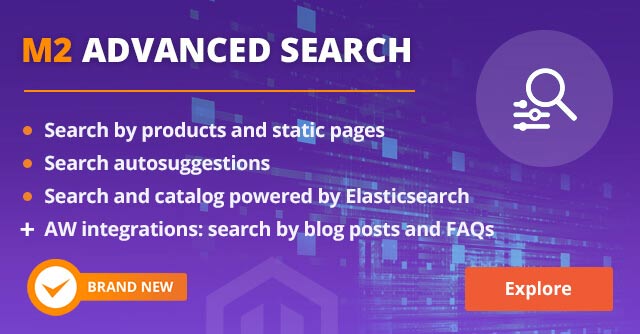
Advanced Search for Magento 2 by Aheadworks: Quick Product Search with Autocomplete Suggesions
Categorized as : Magento 2 Extensions
When it comes to on-site search, a lot of online retailers definitely underestimate its importance and potential benefits.

If we refer to the statistics, we’ll surprisingly reveal that:
* Source: AquireConver.
So, as the above statistics show, many customers face particular problems using on-site search during their shopping. If we additionally take into consideration that the visitors using search convert 5-6 times more often than the non-search ones, the situation appears to become a real loss of profits.
The search functionality is actually quite complicated and includes many components that need to work properly in order to make the whole process quick, straight, and effective. It comprises autocomplete suggestions, synonyms, recent search history, spelling corrections, and, of course, speed and usability.
And, if you want to provide your Magento 2 online store with all the above functions, you can definitely take advantage of the Advanced Search extension by Aheadworks. This brand-new extension includes all the above components and even more combined with the straightforward configuration of the search process.
In general, the advanced search functionality of the extension can be divided into two units: the backend and frontend functionality.
Search by products provided in Magento is not always enough for customers since sometimes, they need to find Magento static pages highlighting store policy terms or to clarify particular details about a certain product on blog or FAQ pages.

The Advanced Search extension provides them with this very opportunity. It allows customers to look through product and static pages and through the pages created by our Blog and FAQ extensions. This significantly extends the set of searchable pages and allows customers to quickly find what they need.
So, the available searchable scope of content is wide, but what about usability?
With the Advanced Search extension, the whole search workflow becomes convenient and straightforward. As soon as users start typing their queries, the module offers them some result suggestions based on the first entered characters. This way, customers do not need to finish typing, which significantly accelerates the whole search process.
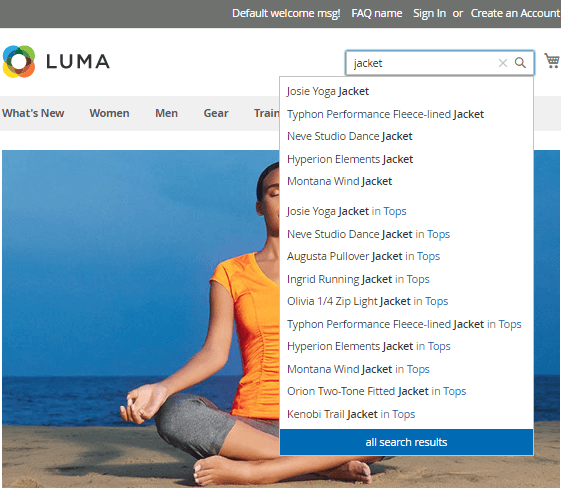
Another benefit of autosuggestions is that they guide customers to particular products. In the world of numerous brands, product types, and multiple product attributes and properties, these “tips” are really appreciated, as they help shoppers to consciously navigate among the enormous number of choices.
A search popup may contain product suggestions, recent searches, and content extracts. A customer is able to either choose a particular result or tap the All Search Results button. The search result pages display both the products containing the search term and its synonyms.
This option allows customers to search products by their names, alternative names, or even their properties and functions determined by store owners as their synonyms.
As a result, this functionality makes the search flexible and allows avoiding catalog exits.
Elasticsearch is also responsible for spelling corrections, this way, finding appropriate results even for the searches with typos.
As soon as the Elasticsearch engine is properly set up and connected, and the Advanced Search extension is installed and enabled, the whole catalog starts working on Elasticsearch, which, as a result, significantly accelerates the entire workflow in a web store.
The first thing you should do right after the extension installation is to set up Elasticsearch. For that purpose, follow the next path: Stores -> Configuration -> Catalog -> Catalog -> Catalog Search and select the Advanced Search option in the Search Engine dropdown.
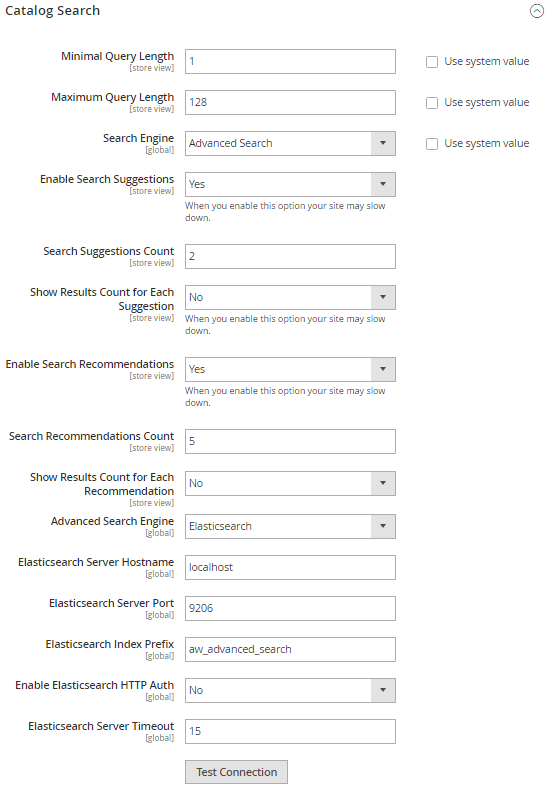
Except for the advanced search options, the unfolded section allows you to set up the connection with Elasticsearch as the advanced search engine providing its server hostname, server port, and index host name.
The additional settings make it possible to enable Elasticsearch HTTP Authorization and server timeout. You can get more information on the above setting from the Magento DevDocs.
Now, when Elasticsearch is set up as described above, the search functionality and the whole catalog are going to work on it. The next step is the extension settings.
The general extension settings are located under Stores -> Configuration -> Aheadworks extensions -> Advanced Search. The configuration page is devided into two sections: General and Search Autocomplete Suggestions Configuration.
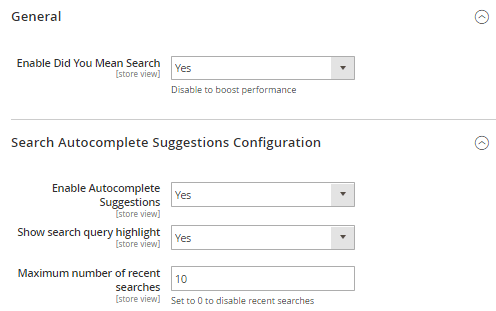
The General section allows enabling/disabling the extension, while the Search Autocomplete Suggestions Configuration section makes it possible to configure particular aspects of the extension's frontend behavior.
In particular, you can enable autocomplete suggestions, highlight or not search queries in the popup, and determine the maximum number of recent searches to be displayed.
We’ve already told that the extension is able to search inside the product and static pages, Aheadworks Blog and FAQ extension page content. In order to enable this functionality, you have to create and configure the corresponding search indexes. For the purpose, follow the Marketing -> Advanced Search by Aheadworks -> Index Management path.
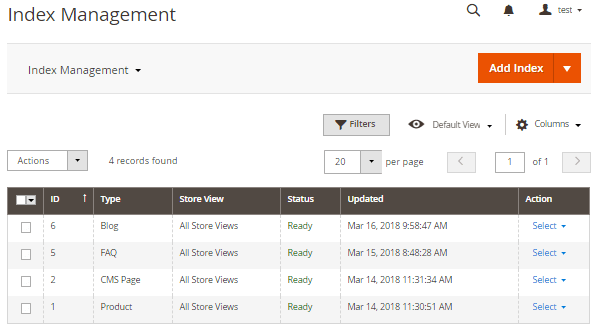
On this page, you can add new, edit, delete, or invalidate existing indexes. Here, you can also track the status of the currently available indexes. In order to add a new index, tap on the top-right arrow next to the Add Index button and select the type of the index you need to create.
As soon as you enter the New Index (or Edit Index) page, you can enable/disable the index, select the eligible store view, and add searchable attributes with their weights. The latter defines how important the role of a given attribute in the search query is. Attributes and their weights are the main parameters that directly influence the relevance of search results.
Note: All the searchable attributes and their weights existing prior to the installation of the extension will be fetched and used automatically.
The quality of search significantly depends on search terms and synonyms. So, we improved the backend process of adding synonyms to the existing or new synonym groups. Now, you can do it easily directly from the Search terms page. Just select one or several terms on the page and use the mass-action dropdown to add the terms to the existing synonym groups in a few clicks.
Actually, Elasticsearch is a third-party solution and may work on a remote server. Still, your store is not going to lose the search functionality in case of any connection issues related to Elasticsearch. If something like this happens, the store will be immediately switched to the native MySQL search engine and allow customers to continue website searching.
Layered Navigation 1.8 is integrated with Advanced Search 1.0 allowing customers to filter search result pages and narrow down the selections until they find the item they need.
Also, our latest Blog 2.4 and FAQ 1.1 extensions can be used together with Advanced Search, which makes it possible to search through the blog posts and FAQ pages content.
Currently, the Advanced Search extension for Magento 2 is available for purchasing in our store. Please visit the product page and read the user documentation to get some other information on the module's functionality. Also, visit the demonstration store to try the extension in action.
We also appreciate any feedback or functionality requests providing that we have a lot of things planned for the next updates. So, please let us know if you need something to be added most of all. Thank you.

If we refer to the statistics, we’ll surprisingly reveal that:
- 16% of websites do not allow searching by product names or models despite this information is contained on product pages;
- 18% of websites provide no meaningful results even if a customer types only one character wrong;
- 70% of websites require customers to use only specific words and expressions in order to get successful results;
- Autocomplete suggestions are found on 82% of websites, but only 46% of them are considered to be quite useful and relevant.
* Source: AquireConver.
So, as the above statistics show, many customers face particular problems using on-site search during their shopping. If we additionally take into consideration that the visitors using search convert 5-6 times more often than the non-search ones, the situation appears to become a real loss of profits.
The search functionality is actually quite complicated and includes many components that need to work properly in order to make the whole process quick, straight, and effective. It comprises autocomplete suggestions, synonyms, recent search history, spelling corrections, and, of course, speed and usability.
And, if you want to provide your Magento 2 online store with all the above functions, you can definitely take advantage of the Advanced Search extension by Aheadworks. This brand-new extension includes all the above components and even more combined with the straightforward configuration of the search process.
Advanced Search for Magento 2
In general, the advanced search functionality of the extension can be divided into two units: the backend and frontend functionality.
Search Benefits for Customers
Search Pages
Search by products provided in Magento is not always enough for customers since sometimes, they need to find Magento static pages highlighting store policy terms or to clarify particular details about a certain product on blog or FAQ pages.

The search results page
The Advanced Search extension provides them with this very opportunity. It allows customers to look through product and static pages and through the pages created by our Blog and FAQ extensions. This significantly extends the set of searchable pages and allows customers to quickly find what they need.
Automatic Suggestions
So, the available searchable scope of content is wide, but what about usability?
With the Advanced Search extension, the whole search workflow becomes convenient and straightforward. As soon as users start typing their queries, the module offers them some result suggestions based on the first entered characters. This way, customers do not need to finish typing, which significantly accelerates the whole search process.

Search result automatic suggestions
Another benefit of autosuggestions is that they guide customers to particular products. In the world of numerous brands, product types, and multiple product attributes and properties, these “tips” are really appreciated, as they help shoppers to consciously navigate among the enormous number of choices.
A search popup may contain product suggestions, recent searches, and content extracts. A customer is able to either choose a particular result or tap the All Search Results button. The search result pages display both the products containing the search term and its synonyms.
This option allows customers to search products by their names, alternative names, or even their properties and functions determined by store owners as their synonyms.
As a result, this functionality makes the search flexible and allows avoiding catalog exits.
Spelling Corrections
Elasticsearch is also responsible for spelling corrections, this way, finding appropriate results even for the searches with typos.
Increased Productivity
As soon as the Elasticsearch engine is properly set up and connected, and the Advanced Search extension is installed and enabled, the whole catalog starts working on Elasticsearch, which, as a result, significantly accelerates the entire workflow in a web store.
Elasticsearch configuration settings
The first thing you should do right after the extension installation is to set up Elasticsearch. For that purpose, follow the next path: Stores -> Configuration -> Catalog -> Catalog -> Catalog Search and select the Advanced Search option in the Search Engine dropdown.

The Catalog Search settings section
Except for the advanced search options, the unfolded section allows you to set up the connection with Elasticsearch as the advanced search engine providing its server hostname, server port, and index host name.
The additional settings make it possible to enable Elasticsearch HTTP Authorization and server timeout. You can get more information on the above setting from the Magento DevDocs.
Extension Settings
Now, when Elasticsearch is set up as described above, the search functionality and the whole catalog are going to work on it. The next step is the extension settings.
The general extension settings are located under Stores -> Configuration -> Aheadworks extensions -> Advanced Search. The configuration page is devided into two sections: General and Search Autocomplete Suggestions Configuration.

The extension configuration page
The General section allows enabling/disabling the extension, while the Search Autocomplete Suggestions Configuration section makes it possible to configure particular aspects of the extension's frontend behavior.
In particular, you can enable autocomplete suggestions, highlight or not search queries in the popup, and determine the maximum number of recent searches to be displayed.
Index Management
We’ve already told that the extension is able to search inside the product and static pages, Aheadworks Blog and FAQ extension page content. In order to enable this functionality, you have to create and configure the corresponding search indexes. For the purpose, follow the Marketing -> Advanced Search by Aheadworks -> Index Management path.

The Index Management grid
On this page, you can add new, edit, delete, or invalidate existing indexes. Here, you can also track the status of the currently available indexes. In order to add a new index, tap on the top-right arrow next to the Add Index button and select the type of the index you need to create.
As soon as you enter the New Index (or Edit Index) page, you can enable/disable the index, select the eligible store view, and add searchable attributes with their weights. The latter defines how important the role of a given attribute in the search query is. Attributes and their weights are the main parameters that directly influence the relevance of search results.
Note: All the searchable attributes and their weights existing prior to the installation of the extension will be fetched and used automatically.
Synonym Management
The quality of search significantly depends on search terms and synonyms. So, we improved the backend process of adding synonyms to the existing or new synonym groups. Now, you can do it easily directly from the Search terms page. Just select one or several terms on the page and use the mass-action dropdown to add the terms to the existing synonym groups in a few clicks.
Other Benefits
Failure-proof support
Actually, Elasticsearch is a third-party solution and may work on a remote server. Still, your store is not going to lose the search functionality in case of any connection issues related to Elasticsearch. If something like this happens, the store will be immediately switched to the native MySQL search engine and allow customers to continue website searching.
Integrations with Aheadworks Extensions
Layered Navigation 1.8 is integrated with Advanced Search 1.0 allowing customers to filter search result pages and narrow down the selections until they find the item they need.
Also, our latest Blog 2.4 and FAQ 1.1 extensions can be used together with Advanced Search, which makes it possible to search through the blog posts and FAQ pages content.
Conclusion
Currently, the Advanced Search extension for Magento 2 is available for purchasing in our store. Please visit the product page and read the user documentation to get some other information on the module's functionality. Also, visit the demonstration store to try the extension in action.
We also appreciate any feedback or functionality requests providing that we have a lot of things planned for the next updates. So, please let us know if you need something to be added most of all. Thank you.




